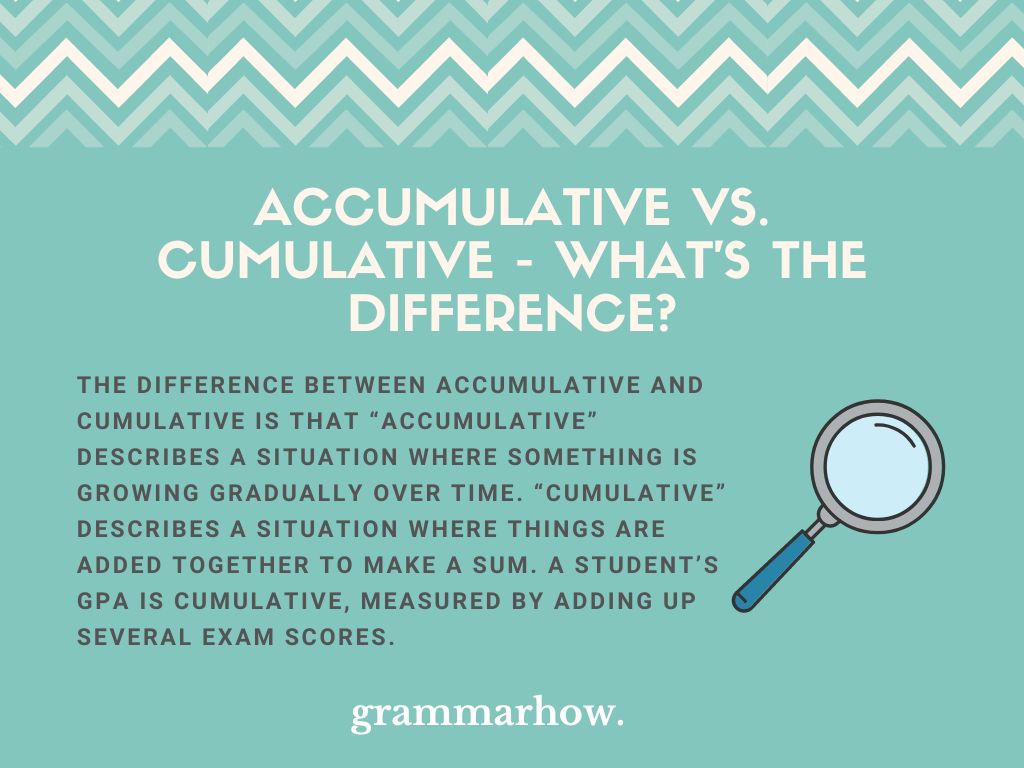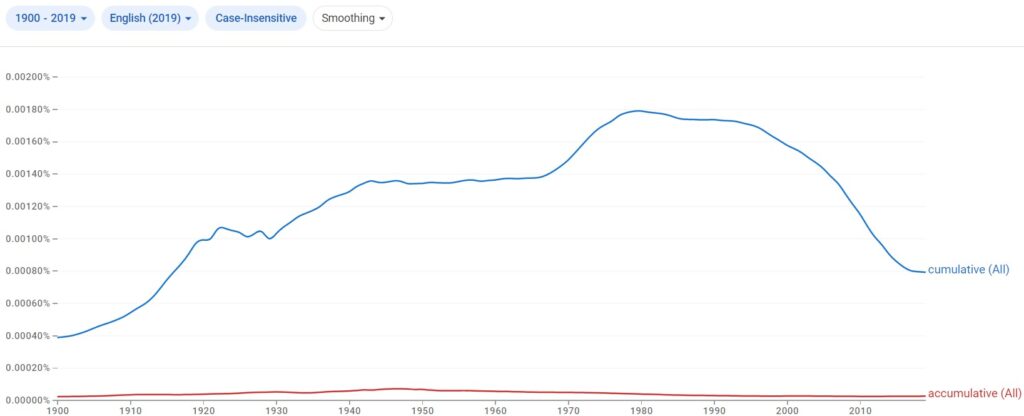The words “cumulative” and “accumulative” are very similar. But what is the actual difference between them? Is there any difference at all, or are they just similar words for the same thing? In this post, we will explain the difference between the two.
Accumulative vs. Cumulative – What’s the Difference?
The difference between accumulative and cumulative is that “accumulative” describes a situation where something is growing gradually over time. “Cumulative” describes a situation where things are added together to make a sum. A student’s GPA is cumulative, measured by adding up several exam scores.

If that difference seems very minor to you, that’s because it is. In fact, in modern English, the distinction between these two words is hardly even worth making. If you look at this graph from Google’s Ngram Viewer, you’ll see that “cumulative” is used overwhelmingly more often than “accumulative”.

That’s because the difference in definition is so minor that “cumulative” can effectively cover both definitions. Both words just describe something growing larger due to addition. “Cumulative” could easily be used to describe both. That’s why “Accumulative” is barely used.
Still, if you really want to be a stickler for using the right word in the right situation, let’s look at some examples to investigate the differences:
- The cumulative score of the team is 42 points.
In this example, the total sum of “42” is a result of many different numbers being added together. One player may have scored ten points, while another scored five, and so on. All of these different values are added together to get the final score. So, the score is cumulative.
In the same way, cumulative GPA is a number that is based on all of your grades throughout high school being added together. But “accumulative” is different:
- The accumulative effects of smoking has damaged the man’s lungs.
In this sentence, the final result (damage to the man’s lungs) comes from a gradual buildup of something smaller (effects of smoking) over time. This is accumulative.
Accumulative
Merriam-Webster defines “accumulative” as, “tending or given to increase or growth by addition especially when continuous or repeated”. It also offers an even shorter definition, that being “cumulative”.
That the dictionary uses “cumulative” as a definition for “accumulative” should prove just how pointless “accumulative” is in modern English. It is used so rarely that that “cumulative” is considered to cover its entire meaning.
Still, it is its own word, with the slightest of differences in meaning. “Accumulative” specifically describes something that grows due to gradual increase over time.
- My accumulative salary is now $65,000 thanks to yearly raises.
- The accumulative cost of my electric bill over the past six months is $750.
- The accumulative effects of sitting eight hours a day will be difficult to bear as I age.
In all of these examples, the thing that is increasing in size is doing so over a long period of time, due to steady increase. This is accumulative.
Cumulative
Merriam-Webster defines “cumulative as, “increasing by successive additions”. This means that something is growing because more things keep getting added to it, not due to gradual growth over time. Age is accumulative. But let’s say you have a jar that you keep spare change in.
The money in that jar is cumulative. It only grows in size as you add more money to it. If you stop adding money to it, it will not grow in size. Therefore, the value of that money is cumulative, not accumulative. Consider the following examples:
- Our team’s cumulative score is twenty points.
- The cumulative size of my wardrobe increases whenever I buy new clothing.
- My cumulative GPA from high school is 3.6.
In these examples, the thing being described by “cumulative” (score, wardrobe, GPA) increases in size only when something is added to it (points, clothing, grades).
Conclusion
In most cases, you can just use “cumulative” to cover the meaning of “accumulative” as well. But on a technicality, all you need to remember is this: “cumulative” describes something that is a result of many things added together successively.
“Accumulative” describes things that are a result of a gradual and steady increase over time.
